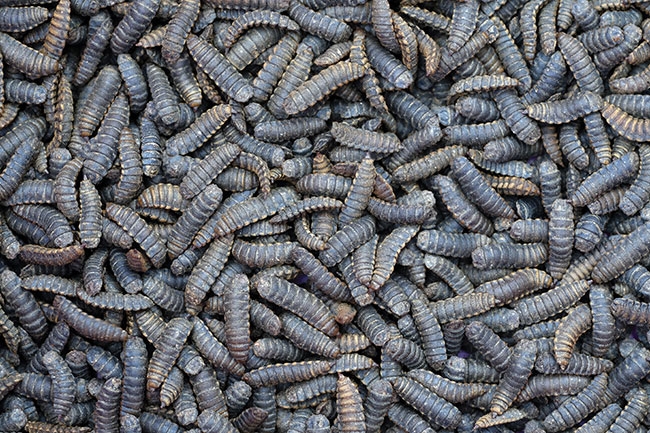
Insect protein for poultry rations
By Lilian Schaer
Features Nutrition and Feed Research annex Broiler production Canada Livestock Production Livestock Research Nutrition Ontario Poultry Production Research Researchers are studying ways to reduce the cost of insect protein to make it a viable alternative.
Researchers are studying ways to reduce the cost of insect protein to make it a viable alternative. There’s a new poultry ration ingredient available on the Canadian market. Insect meal from defatted black soldier fly larvae is high in protein and low in fat, making it a potentially attractive alternative to soy in poultry diets.
For it to be used on commercial egg farms, though, more needs to be known about its impacts on both production and costs. That’s where Elijah Kiarie, assistant professor in poultry nutrition at the University of Guelph, comes in.
His master’s student Zipporah Mwaniki recently completed a project that replaced about 60 per cent of soy protein in layer rations with black soldier fly larvae meal, and is now working on new research where soy protein is entirely substituted with insect meal.
“Feed accounts for more than 65 per cent of the variable costs of poultry production, and energy and amino acids make up more than 90 per cent of this cost,” Kiarie explains. “Right now the cost of insect protein is still high but we are looking to see what we can do to reduce these costs to make this a good alternative to soy and animal proteins such as meat and bone meal.”
Insect protein is also a great fit for organic poultry producers who have limited ingredient pools for their rations, he adds.
Defatting the meal and using the extracted fat in biodiesel production is one way to create additional value from insect production. As well, Kiarie says black soldier flies consume organic waste, which would help turn some of the 1.3 billion tons of food that is wasted every year around the world into a useful product with value.
Perhaps most interesting for producers, though, are the results of the first trials feeding insect protein to layers alongside soy.
There was no difference in egg production volume, but there was some noted variation in egg size as well as differences in yolk colour – the insect-fed birds produced eggs with darker yolks.
“Egg size is very important so it’s not good that there is variability, but consumers like stronger colours in the yolk, so that’s a positive development,” he says.
Most surprising to Kiarie, however, was that eggs from hens fed the insect protein had better shell quality with higher thickness and strength. This suggests the new protein might have other benefits beyond just nutrition – one of the issues challenging North American and European egg producers is a decrease in egg shell quality and skeletal system strength as birds age.
“We are seeing a stronger shell with insect protein, so maybe it can have an impact on bones too. This is an exciting possibility because we need birds with strong skeletal systems as we move hens out of the cage system so maybe there is potential to rear stronger pullets,” he says, adding that this is an area in need of further exploration.
It’s also interesting to note that insects are almost 10 per cent fibre, called “chitin”, and preliminary data suggests there may be gut health benefit for the birds as well. What’s more, fibre’s ammonia-reducing properties could make for a better barn environment that would benefit both farmers and their flocks.
“Poultry will never digest everything we feed them but with what they do excrete, we want to have minimal impact on the environment and on bird and farmer health,” Kiarie says.
This research is supported by a discovery grant from the Natural Sciences and Engineering Research Council and the Ontario Ministry of Agriculture, Food and Rural Affairs – University of Guelph partnership. Kiarie’s position is supported by the McIntosh Professorship in Poultry Nutrition.
This article is provided by Livestock Research Innovation Corporation as part of LRIC’s ongoing efforts to report on Canadian livestock research developments and outcomes.
Lilian Schaer is a freelance writer and editor and communications specialist with Agri-Food Project Services Ltd. in Guelph, Ont.
Print this page